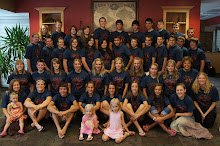Marketing shift seen for Millennial generation
Also, 75 percent sent more than 20 text messages per day and 58 percent used Twitter "all the time," yet only 5 percent planned to buy a PC.
Those students, who are starting their college life as soon as today, are the youngest of a tech-infused millennial generation who - in sharp contrast to Baby Boomers and other previous generations - no longer view a driver's license as a rite of passage into adulthood.
"For millennials, if you were to think about the thing that enables freedom and independence, it's your first cell phone, and it not happening when you're in your late teens or early 20s," said Ford Motor Co. futurist Sheryl Connelly. "It's probably happening in your preteen years,"
Connelly, the automaker's manager of global trends and futuring, headed a panel discussion last week at Twitter Inc. headquarters in San Francisco on how Ford was designing cars and marketing to appeal to the 16-to-32 age group known as the millennial generation.
At the same time, Mr Youth, a New York marketing services agency that specializes in studying the youth market, released results of a separate survey of 5,000 incoming college students who represent the graduating class of 2015.
Both Ford and Mr Youth presented similar insights into how technology - especially those produced by Bay Area companies like Facebook, Twitter, Netflix, Pandora Media and Apple - are causing a cultural shift in the attitudes of the millennial generation.
To be sure, that generation has also been reshaped by nontech events. The class of 2015, for example, is an "innocence lost" generation forever changed by the sobering terrorist attacks of Sept. 11, 2001, and the economic recession at the end of the decade, said Matt Britton, Mr Youth founder and chief executive officer.
"This has conditioned them to not take anything for granted and appreciate the good things in life," the report said. They also view their parents as role models and are not as rebellious or antiestablishment as Boomers were.
They also believe that the technology at their fingertips gives them the ability to make a difference in the world and "empowered them with a sense that anything is possible if you are willing to work hard," the study said.
"This generation has grown up watching (Facebook co-founder) Mark Zuckerberg build one of the world's most valuable companies through social media. They have seen the influence that organized groups and individuals alike are able to steer via social communities and they are more than capable of wielding this power themselves."
Half the students have more than 300 friends on Facebook and 59 percent visited the social network during class. "Facebook is like a dial tone for this audience," Britton said.
One surprise result showed the effects of online video such as YouTube and Netflix. Only 13 percent of the students planned to subscribe to a cable TV service, a sign of a coming "seismic shift of consumer media consumption habits," Britton said. Right now, "the lion's share" of ad dollars still goes to traditional TV channels, but that may have to change, he said.
Owning less important
Companies like online movie and TV rental service Netflix and video game retailer GameStop, which offers a used-game trading service, have changed the concept of ownership, said Ford's Connelly. That's another shift from the "conspicuous consumption" mantra of Baby Boomers, who "signaled to the world that they were successful through fancy cars, expensive jewelry and very large homes."
"Netflix has really taught us that it doesn't matter if you own a movie as long as you have access to it," she said. "With companies like GameStop, you don't hold onto a game for life, you master the game, you trade it in and you get something else. So the idea of owning is not important to them. There's no stigma about saying, 'I rented this, I borrowed this.' "
And social networking and smart phones are replacing the need to go drive somewhere to connect with friends.
"The average millennial would rather lose their wallet than their cell phone because their cell phone contains much more valuable information and resources," Connelly said. "Through these virtual connections, they actually are transcending time and space, so that they don't need a car as much as they did."
Those changes pose problems for a company used to marketing cars like the luxury Lincoln brand as symbols of life status, a message that wasn't resonating with the millennial generation. Moreover, statistics show that for a variety of reasons, younger people are delaying getting their licenses and are driving less than older generations.
So Ford has begun designing and marketing cars for their ability to keep the owner connected to their world, not for productivity or business reasons cited by Baby Boomers, but for social reasons. That means the ability to connect cars with smart phones is standard equipment.
Video gauge
Also, for a generation bred on video games, Ford has designed a video gauge for electric and hybrid vehicles that turns achieving the best fuel efficiency into a game.
Since one study shows 60 percent of the millennial generation have at least one tattoo, and 40 percent of that group have multiple tattoos, Ford offers a graphics program that lets customers customize their cars. The company also looks at different colors and fabrics that are more expressive, including an Apple-inspired high-gloss finish.
"We belive that this customization is the millennials' way of adding meaning to something that would otherwise be meaningless to them," Connelly said.

